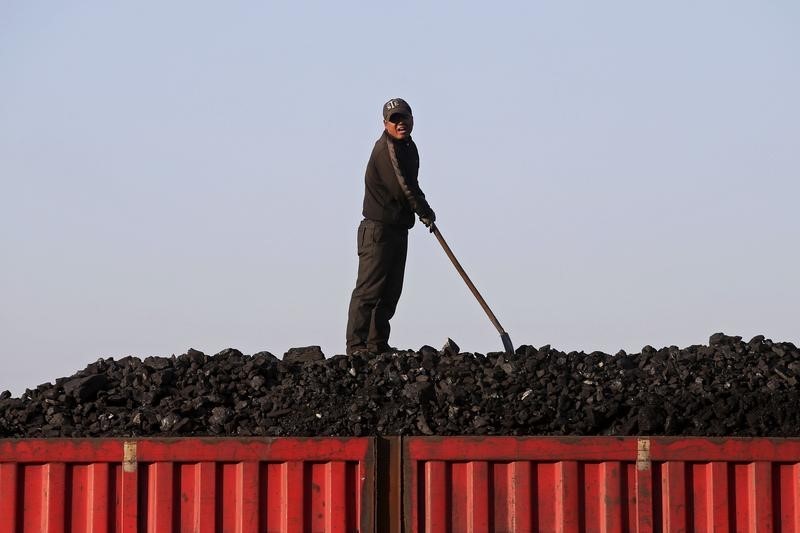(Repeats earlier story for wider readership with no change to text. The opinions expressed here are those of the author, a columnist for Reuters.)
By Clyde Russell
LAUNCESTON, Australia, Feb 20 (Reuters) - Coal markets could be forgiven for feeling slightly confused about the recent signals coming out of top importer China, with both bullish and bearish developments in evidence.
The most obvious bullish news relates mainly to coking coal used in steel-making, and like many announcements in China it's political in nature.
China said on Feb. 18 that it will suspend all imports of coal from its nuclear-armed neighbour North Korea until Dec. 31, a move that, if implemented, would bring a dramatic halt to cargoes from China's fourth-biggest supplier of imported coal. statement from the Ministry of Commerce was brief and didn't go into reasons for the ban, although it came shortly after Pyongyang tested an intermediate-range ballistic missile and the suspected assassination in Malaysia of Kim Jong-nam, the half-brother of North Korean ruler Kim Jong-un.
It's possible that Beijing is sending a message of displeasure to Pyongyang by banning coal imports, although a similar ban announced last April was never implemented.
China's imports of North Korean coal surged 14.5 percent to 22.48 million tonnes in 2016 from a year earlier as buyers took advantage of North Korea's price edge over Australia in supplying high quality coal. customs classifies North Korean coal as anthracite as opposed to coking coal, but in practice North Korean cargoes are mainly used for steel-making or in higher value industries such as ceramics, making them direct competition for coking coal.
Australia and Mongolia are China's top suppliers of coking coal, and both would stand to benefit the most if cargoes from North Korea are indeed halted.
Australia shipped 26.77 million tonnes of coking coal to China in 2016, up 4.8 percent from a year earlier, while Mongolia's supplies leapt 85.2 percent to 23.56 million tonnes, with its rising popularity largely explained by a significant price advantage over Australian cargoes.
However, if North Korea is unable to supply coal for the rest of the year, it's possible that Chinese consumers will be short by about 20 million tonnes of high quality coal, assuming demand from the steel and other sectors remains steady.
Mongolian miners may have difficulty in ramping up output significantly given the transport bottlenecks between the landlocked country and its southern neighbour.
This may result in a larger call on Australian coking coal cargoes, and may open the door for increased supplies from Canada, Russia and even the United States.
Coking coal prices have dropped sharply since reaching just above $300 a tonne in December, with the front-month futures contract for Australian free-on-board cargoes SCAFc1 on the Singapore Exchange closing at $157.17 on Feb. 17.
Coking coal futures on the Dalian Commodity Exchange DJMcv1 jumped as much as 2.8 percent in early trade on Monday, reaching a high of 1,270.5 yuan ($185) a tonne, although they are still well below the peak of 1,618 yuan from November last year.
While the fourfold surge in coking coal prices last year was unsustainable and the retreat since the November high looks reasonable, it's possible that coking coal could receive a renewed boost if the market believes that this time Beijing will choke off imports from North Korea.
POLLUTION POLICIES TO HURT COAL?
A ban on North Korean imports is undeniably bullish for coal, should it happen, but less certain is a draft policy document that proposes measures to curb coal consumption and transportation.
The Ministry of Environmental Protection has proposed forcing steel and aluminium producers to cut output and stop Tianjin port from handling coal, according to a draft document viewed by Reuters. measures are aimed at cutting pollution in northeast China, home to numerous population centres, including the capital Beijing, that suffer from high pollution levels.
While there is no guarantee that a draft document will become official policy, it does support the view that pollution concerns are becoming more important to policymakers.
If the measures are implemented, it would cut coal consumption and make it more challenging for seaborne imports to find a route into northeast China.
What may result is a tug-of-war between reduced demand and lower available supply, which may result in lower prices if demand drops by more, or in higher prices if the demand holds up and the supply can't reach end-users because of restrictions on ports.
For now, it seems that the bullish prospect of a ban on North Korean imports is more likely to materialise than any new major pollution controls, meaning seaborne coking coal prices may be biased higher, at least in the short term.
Overall, it appears that this year's coal prices, particularly for coking grades, may once again be driven largely by Chinese political considerations, as happened in the rally in 2016.
<^^^^^^^^^^^^^^^^^^^^^^^^^^^^^^^^^^^^^^^^^^^^^^^^^^^^^^^^^^^ Chinese coal mine output
http://tmsnrt.rs/2jxHpNp
^^^^^^^^^^^^^^^^^^^^^^^^^^^^^^^^^^^^^^^^^^^^^^^^^^^^^^^^^^^> (Editing by Christian schmollinger)
